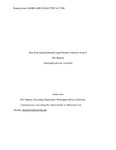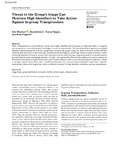| dc.rights.license | In Copyright | en_US |
| dc.creator | Shuman, Eric Matthew | |
| dc.date.accessioned | 2014-06-19T11:49:23Z | |
| dc.date.available | 2014-06-19T11:49:23Z | |
| dc.date.created | 2014 | |
| dc.identifier | WLURG38_Shuman_PSYC_2014 | |
| dc.identifier.uri | http://hdl.handle.net/11021/28511 | |
| dc.description | Thesis; [FULL-TEXT FREELY AVAILABLE ONLINE] | en_US |
| dc.description | Eric Shuman is a member of the Class of 2014 of Washington and Lee University. | en_US |
| dc.description | Eric has continued his research on this topic and has allowed us to include a reprint of the article from Personality and Social Psychology Bulletin. | en_US |
| dc.description.abstract | The current research investigated the implications of ingroup transgressions on identity threat, ingroup directed anger, and collective action about ingroup transgressions. It also considered the moderating role played by national identification. In four studies, participants' group identity was threatened with the presentation of an ingroup transgression (description of US abuse at Guantanamo Bay). Participants were then given the opportunity to engage in various forms of collective action such as writing a letter to their congressmen and donating money to an organization working to close Guantanamo Bay. In all three studies where the manipulation was successful, ingroup directed anger fully mediated the relationship between identity threat and collective action, supporting the hypothesis that ingroup directed anger is an important emotional driver of collective action in response to ingroup transgressions. These studies also demonstrated that conventional attachment with its high levels of glorification is a significant impediment to ingroup directed anger and collective action. On the other hand, critical attachment, attachment without glorification, can actually be an important variable in promoting collective action and does not impede the experience of ingroup directed anger. In sum, these studies demonstrate that anger about ingroup transgressions can be a powerful motivator of collective action to correct these transgressions, but national identification can both help and hinder this process. | en_US |
| dc.description.statementofresponsibility | Eric Shuman | |
| dc.format.extent | 109 pages | en_US |
| dc.language.iso | en_US | en_US |
| dc.rights | This material is made available for use in research, teaching, and private study, pursuant to U.S. Copyright law. The user assumes full responsibility for any use of the materials, including but not limited to, infringement of copyright and publication rights of reproduced materials. Any materials used should be fully credited with the source. | en_US |
| dc.rights.uri | http://rightsstatements.org/vocab/InC/1.0/ | en_US |
| dc.subject.other | Washington and Lee University -- Honors in Psychology | en_US |
| dc.title | How Does Ingroup Directed Anger Promote Collective Action? (thesis) | en_US |
| dc.type | Text | en_US |
| dcterms.isPartOf | RG38 - Student Papers | |
| dc.rights.holder | Shuman, Eric Matthew | |
| dc.subject.fast | Anger | en_US |
| dc.subject.fast | Group identity | en_US |
| dc.subject.fast | Nationalism | en_US |
| dc.subject.fast | Social groups -- Psychological aspects | en_US |
| local.department | Psychology | en_US |
| local.scholarshiptype | Honors Thesis | en_US |

